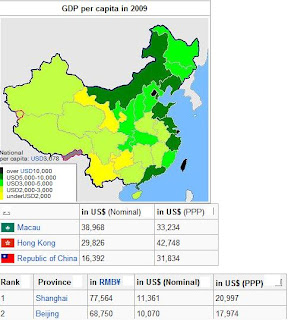Q&A: What's behind China's recent labour unrest?
http://www.business-standard.com/india/ ... t/97972/on
A string of strikes at foreign-owned factories in southern China, especially Honda vehicle plants and parts suppliers, has highlighted the rising demands of young Chinese workers from the countryside.
A series of suicides at Foxconn, an electronics maker with a huge plant in southern China, has intensified attention on discontent in China's labour force.
Here are some questions and answers about the unrest.
HOW SERIOUS IS IT?
The unrest has been localised and is likely to remain so, but its implications are broad.
The reported strikes since May have disrupted a few factories but barely dented production at Honda, the main company hit. But the disputes reflect the demands of younger migrant workers who expect better wages and conditions than their parents accepted, and who feel underpaid in the face of rising prices and living standards.
Labour unrest in the vast industrial belt hugging coastal China has grown in recent years.
The strike organisers at the Honda plants have shown that a younger generation of workers -- with their higher expectations and savvy use of the Internet and cell phones to mobilise -- could present a tougher challenge to managers and officials.
Demography could also give workers more bargaining power.
The number of Chinese between the ages of 15 and 24 has held at around 200 million to 225 million for the past 20 years. That number is likely to fall by a third in the next 12 years, according to Arthur Kroeber of Dragonomics, an economic consultancy in Beijing.
WHAT ARE THE WORKERS DEMANDING?
Mostly they want pay rises, but they have also been sensitive to any hints that managers are threatening their cohesion.
Workers at the Honda-associated plants have complained of long hours, including forced overtime, for pay that often totals 1,000-2,000 yuan ($146-$292) per month. They have demanded pay rises of several hundred yuan a month.
Some of the recent disputes have brought sizeable pay increases, including a 66 percent raise for workers at Foxconn, and 20 percent or more for workers in the first Honda strike at a vehicle assembly plant. Vehicle parts makers have offered workers smaller rises.
In many of China's private factories, state-run trades unions are either non-existent or shells controlled by management. Some striking workers have said they want to form their own independent unions, but that demand has not taken hold widely.
COULD THE UNREST SPREAD?
It could, especially in factories around Shenzhen and Dongguan in southern China where migrant worker discontent about conditions runs deepest.
But even there, the vast majority of factories continue production as usual. The most common response of workers to unsatisfactory conditions remains quitting, not striking.
The example of Honda, however, could bolster demands at other manufacturers for wage rises and better conditions. State media have barely mentioned the unrest, but word travels quickly among workers connected by the Internet.
Beyond China's far southern manufacturing zone, worker protests have been common for years, but the latest unrest appears very unlikely to escalate into nationwide stoppages.
Chinese workers in state-owned factories and mills have their own complaints about wages, conditions and dismissals, especially when those plants have been privatised, prompting claims of corruption and profiteering. Some of them may feel emboldened.
But these workers tend to be older and have little to do with migrant labourers from the countryside. No alliance is likely.
In many big state-owned companies, the booming economy has boosted profits and wages. Their workers are not spoiling for confrontation.
WHAT WILL THE GOVERNMENT DO?
Expect a piecemeal response, not a thunderclap of policy changes.
The Chinese government faces contending pressures over how to deal with the workers' demands, and that means the official response is likely to be low-key and vary from place to place.
Chinese President Hu Jintao and Premier Wen Jiabao have said that improving the incomes and welfare of farmers and ordinary workers is a cornerstone of their policies.
But much of the country's exports have long relied on cheap labour. Local officials in particular will be reluctant to risk losing investment by allowing a rapid rise in industrial wages.
Chinese leaders have so far avoided direct comment on the strikes, perhaps because they are reluctant to fan word of the unrest that could embolden other unhappy workers.
In recent years, the Chinese government has shifted from treating all worker unrest as a threat to its control. It has opened up channels for employees to lodge complaints and pulled back from using police against strikers.
Workers often say the formal complaint procedures are useless and tilted against them. The government may try to make those procedures more effective.
If worker demands spread and become more political by embracing calls for independent unions, the government response is likely to harden to include more arrests and detentions of strike organisers.
